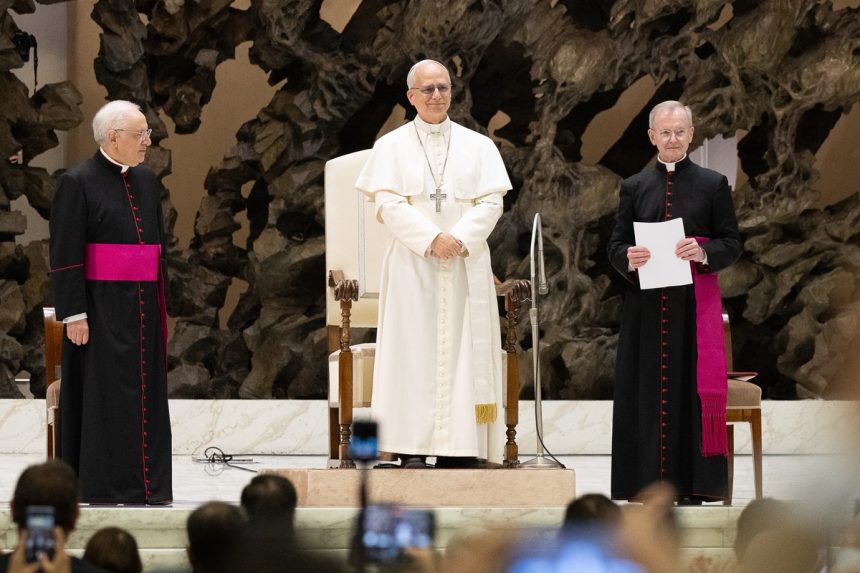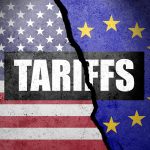As Pope Leo XIV marks his first 100 days in the Vatican, a clear picture of his papacy is emerging — one marked by calm leadership, theological depth, and a deliberate move away from controversy. While his gestures echo the energy of his predecessor, Pope Francis, Leo has opted for a quieter, more traditional path that appeals to both the Church’s center and its peripheries. “He’s been very direct and forthright … but he’s not doing spontaneous press hits,” said Kevin Hughes of Villanova University.
A Papacy Rooted in Calm and Clarity
Pope Leo XIV’s leadership has signaled a departure from the unpredictable style of Pope Francis. In contrast to Francis’ impromptu comments and press-friendly surprises, Leo appears committed to a more stable, reserved form of leadership. “Even those who really loved Pope Francis always kind of held their breath a little bit,” said Kevin Hughes, noting that Leo brings “relief to many” through his steady, predictable demeanor.
His popemobile ride around St. Peter’s Square felt like a nod to Francis, but his message — urging youth to be “the salt of the Earth, the light of the world” — was delivered in a style all his own, calmly and in multiple languages.
Healing Without Headlines
Rather than court controversy, Leo has focused on bridging the divides left from the previous papacy. His tone has been healing and conciliatory, especially with the Vatican bureaucracy. “Popes come and go, but the Curia remains,” Leo remarked early in his papacy — a subtle but significant olive branch.
His emphasis on artificial intelligence as a shared challenge has helped unify conservatives and progressives alike — a contrast to Francis’ more polarizing focus on the environment and migrant rights.
Continuing the Francis Legacy — Selectively
Despite his differences in style, Leo has built on some of Francis’ most significant initiatives. He celebrated the Vatican’s first eco-themed Mass and authorized a 1,000-acre solar farm project to help Vatican City become the world’s first carbon-neutral state.
He’s also fine-tuned the Vatican’s financial reforms and solidified the legacy of Pope Francis by endorsing Saint John Henry Newman as a doctor of the Church. Still, Leo has avoided attention-grabbing interviews and refrained from repeating Francis’ bold declarations, like labeling nuclear weapon possession “immoral.”
Grounded in Augustinian Thought
From day one, Pope Leo XIV identified himself as a “son of St. Augustine,” signaling a deep spiritual and philosophical foundation for his papacy. Augustine’s influence can be heard in nearly every homily and address.
“He is presenting all these things with an Augustinian flavor,” said Kevin Hughes, an Augustine scholar. Having led the Augustinian order as prior general, Leo’s papacy is already reflecting its values: interiority, community, and seeking God’s truth together. There’s speculation that Leo may invite Augustinian friars to live with him in the Apostolic Palace to embody this communal spirit more fully.
A Missionary Heart, Formed by Francis
Leo’s roots as a missionary in Peru and his appointment as bishop of Chiclayo in 2014 by Francis highlight the influence of his predecessor. Emilce Cuda noted that Leo reflects “the unity of difference,” explaining that “he comes from the center, but he lives in the peripheries.” His experience aligns with Francis’ vision of a church that goes beyond its walls to serve the marginalized.
However, their personal relationship wasn’t always smooth. Leo once recalled denying a priest transfer request from then-Archbishop Bergoglio — a move he thought Francis might hold against him. Ironically, Bergoglio not only appointed him bishop but laid the path for him to become the first North American pope.
Quiet Strength in a Time of Transition
While Pope Francis captured headlines and hearts through bold reforms and outspoken gestures, Leo XIV’s first 100 days reveal a different type of leadership — one that fosters peace, emphasizes tradition, and prioritizes unity over attention. His deliberate pace and grounded approach are already being felt across the global Church.
Maria Isabel Ibarcena Cuarite, a young Catholic from Peru, said she found clarity in Leo’s firm stance on Church teachings. “Francis was ambiguous, but he is firm,” she said, appreciating Leo’s emphasis on tradition and sacraments.
Pope Leo XIV’s emerging papacy seems to offer what many Catholics have longed for: a calming rain after a stormy season. With deep theological roots, a unifying tone, and a patient approach, Leo is shaping a Church focused not on the headlines, but on Christ, peace, and community. In the words of Kevin Hughes, his presence is “a relief to many” — and perhaps just the pause the Church needs.






